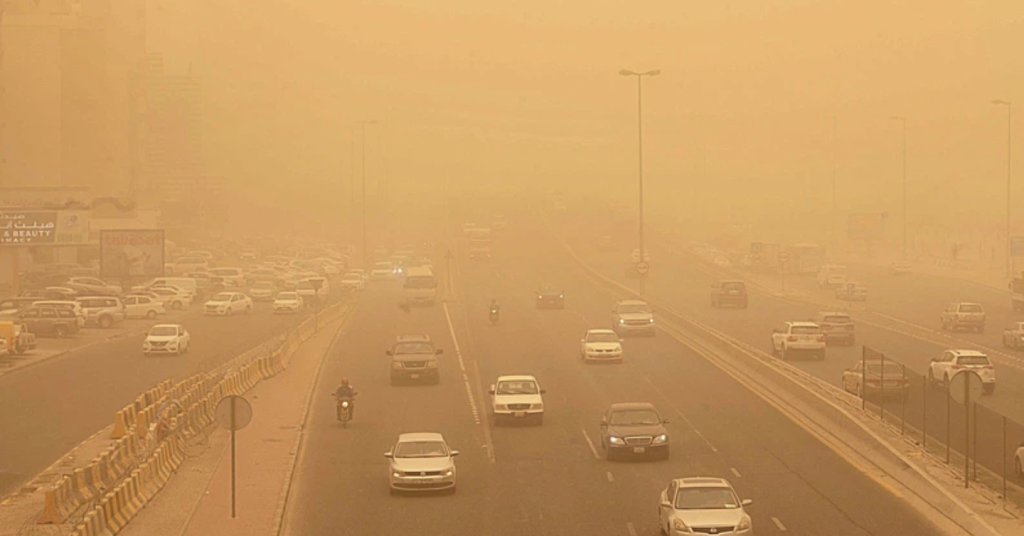By Albert Oppong-Ansah
Accra, Dec. 18, GNA – The Ghana Meteorological Agency (GMet) has advised the public, especially children, pregnant women, older adults, persons with pre-existing heart and lung disease, to mask up to keep safe in the dusty dry air.
The Agency has also cautioned susceptible persons to limit outdoor activities, noting that the pollution levels could trigger allergic reactions and worsen conditions, including asthma.
Madam Francisca Martey, Deputy Director and Head of Research and Applied Meteorology at the Agency, told the Ghana News Agency (GNA) that it had observed the occurrence of dry air in the atmosphere with high levels of dust pollutants, originating from the Sahel region.
She said the weather condition could span be experiencd until the latter part of December.
In Accra, analysis of data collected early December 2023 made available to the GNA by the Breathe Accra Project showed high levels of pollution at all monitoring locations in the country.

Professor Kofi Amegah, the Breathe Accra Project Lead, told the GNA that Madina Zongo Junction, Agbogbloshie, Makola, Nima and Chorkor were recording dangerously high levels.
He said the main constituent of the dust was Particulate Matter (PM) 2.5 – fine (smaller) particles, which could penetrate deep into the respiratory and cardiovascular system and hence hazardous to health.
PMs are seen and unseen tiny pieces of solids or liquids in the air. The particles include, dust, dirt, soot, smoke. Breathing in these particles can be harmful to one’s health.
Professor Amegah, also an Associate Professor of Epidemiology at the University of Cape Coast, said per the Air Quality Index (AQI), the ideal or good air quality should be between the range of zero to 50 on the index.
AQI from 51 to 100 is moderate even though there may be some health concerns for a small unusually sensitive individuals like children under five.
Professor Amegah asked the public to consume antioxidant-rich foods, including fruits and vegetables during the period to mitigate the air pollution exposure effects on one’s health.
Mrs Florence Kuukye, Director, Metro Public Health Department of the Accra Metropolitan Assembly, advised the public not to compound the high levels of air pollution with open burning.
She said aside the two national laws, the AMA’s byelaw 2017 prohibited people from engaging in open burning of waste materials.
“Under the AMA law for instance, a person commits an offence when found to be engaged in open burning and when found culpable, one is likely to pay a penalty of not less than 100 penalty units (not less than GHS 1,200/USD 100) and not more than 150 penalty units, or sentenced to prison from three to six months or both,” she explained.
Dr Mary Enyram Ashinyo, Deputy Director, Institutional Care Division, Ghana Health Service, speaking at a forum earlier this year, about air pollution situation, said individuals who exposed themselves to particles emitted into the atmosphere risked contracting respiratory-related diseases.
She said persons, who were already suffering from breathing difficulties and other respiratory diseases could compound their conditions if they ignored precautionary measures during this period.
Already, a section of the public the GNA spoke to last week complained of respiratory conditions, including cold and flu.
Mr Vincent Newton, a father of four, said within the week, his children and wife contracted flu and had to go for medication to ameliorate the symptoms.
“My son who is asthmatic was not able to write two of his end of term examination papers due to the condition,” he said.
In 2019, approximately 3,000 premature deaths were attributed to air pollution in Accra.
At the country level, air pollution related deaths (23,792) exceed those from malaria (21,597), tuberculosis (10,222), and HIV/AIDS (14,620) in the same year.
The data above shows the financial cost of air pollution related premature mortality and absenteeism in 2019 and the projected impacts under a business-as-usual scenario, according to Clean Air Fund.
GNA
This story is a collaboration with New Narratives. Funding was provided by the Clean Air Fund. The content is independent of the opinions of the funder.